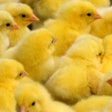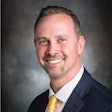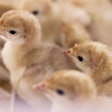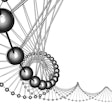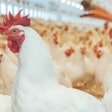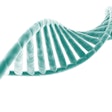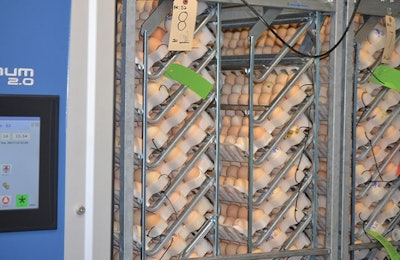
Aviagen opened its newest and largest parent stock hatchery at Quitman, Georgia, in June 2019, enabling the company to better serve its customers in the United States and abroad.
The hatchery is strategically located in south Georgia, with easy access to broiler companies in Georgia, Alabama and the Carolinas. It is also located midway between international airports in Atlanta and Miami to serve Aviagen’s international customers. In fact, Rickey Cates, Aviagen's assistant director of hatcheries, said the first order filled at the Quitman hatchery was for an international customer, with the chicks being flown overseas from Miami.

From left: Rickey Cates, Mark Roberts, Jason Mack and Rick Brunson, Aviagen. | Photo by Roy Graber
While the company had ideas of where the best location would be for the hatchery, which produces Ross and Arbor Acres breeds, a new industrial park south of Quitman came to be the logical choice. Aviagen became the first tenant at the industrial park.
“We talked to three or four different economic development committees,” explained Mark Roberts, Aviagen's director of hatcheries. “Really, it’s been a great experience and a great choice. Pretty much everything (utility-wise) that’s expensive if you’re not set up was already set up and ready to go.”
It took 13 months to build the 78,000-square-foot, $28 million hatchery.
Capacity and capabilities
The Quitman operation is the largest of the nine U.S. hatcheries in Aviagen’s fleet. It has the capacity to set 1.1 million eggs per week.
Included in the equipment at the new facility are 80 Jamesway Platinum 2.0 next-generation incubators and 56 Jamesway Platinum next-generation hatchers.
The facility also features a climate-controlled, five-chamber HatchTech chick storage cabinet where chicks awaiting transport can be held at optimal temperatures for comfort.

Chicks at the Quitman, Georgia, hatchery pass through quality assurance in preparation for delivery. | Photo by Roy Graber
Supporting Aviagen’s growth
Since 2013, Aviagen has seen significant sales growth due to the popularity of their brands globally, said Jason Mack, vice president of operations.
“That, in turn, means we need a lot more grandparent placements to produce all those chicks,” said Mack.
During the same time frame, Aviagen has seen chick placements essentially double, although some of that growth is attributed to Aviagen’s 2017 acquisition of Hubbard Breeders.
According to Mack, not only will the Quitman hatchery help serve customers in the immediate region and abroad, it can also handle some of the company’s total capacity as it considers making upgrades to its other, older hatcheries.
“With the growth we’ve had in every area, obviously hatcheries have to expand,” said Mack. “It does meet our expansion needs for a while, and hopefully gives us some room to do some renovations at some other facilities.”
Emphasis on biosecurity
Aviagen, with both the construction and operation of the hatchery, made sure every possible biosecurity consideration was addressed.
Cameras are along the exterior of the building, as well as in every room, to assure everyone who is inside the building follows biosecurity measures. The cameras also help the company make sure best animal welfare practices are followed, Cates said.
Everyone who enters areas of the facility where eggs or chicks are is required to shower in, and the building is designed in a way that a person must go through the shower room before moving on to other parts of the hatchery.
Every room has its own HVAC system, meaning there is no duct work going from one room to another. Cates said this means each room has its own air flow and no airborne cross-contamination can occur. There are 44 units on the roof for each room’s air system.
In rooms such as the Embrex lab, where in-ovo vaccinations are prepared, the air is ozonated, and the room has a forced air flow that prevents external air from entering.
Extra precautions were even taken with the walls, ceilings and floors. All pores were sealed, making cleaning and disinfecting easier.
Those biosecurity considerations are all part of Aviagen’s greater mission.
“Our mission is to be the world’s preferred supplier for quality breeding stock,” Mack said. “Everything we do is centered around giving a sustainable source of breeding stock to our customers, and that goes into areas of animal welfare and biosecurity.”







